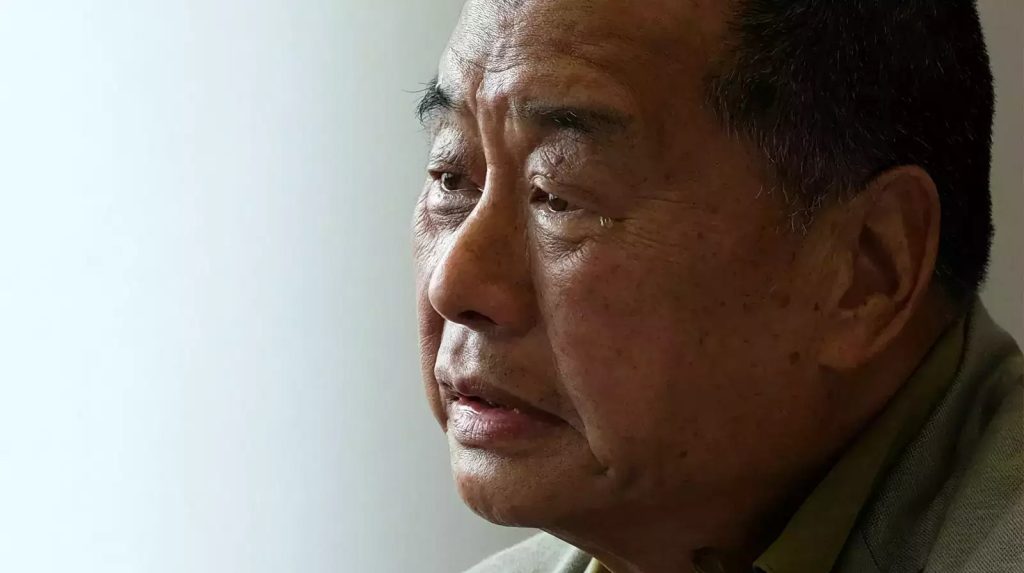Billionaires usually prostrate themselves before autocrats rather than stand up to them: They have so much to lose and so little to gain by speaking truth to power. But Jimmy Lai said goodbye to his billions and went to jail for what looks a hopeless cause — asking China to honour Deng Xiaoping’s pledge when Britain handed over Hong Kong in 1997 that Hong Kong’s unique system of civil rights and independent institutions would continue for 50 years. It was part of Deng’s ‘one country, two systems’ policy.
Such pledges rarely mean much. Few were surprised when Xi Jinping decided that the Hong Kong system was too free and critical to be tolerated and so cracked down on dissenters.
The fight
As civil rights were eroded and destroyed, Hong Kongers staged an “umbrella revolution’ — thousands blocked the streets carrying open umbrellas to protest. Most of Hong Kong’s newspapers discreetly toed the Chinese line. But Apple Daily was at the very forefront of the protests, with Lai himself writing signed articles castigating the Chinese.
He was especially outraged by the National Security Act of 2020 empowering the government to arrest anybody endangering “national security”. The law criminalised any attempt to undermine the authority of the central government.
After the National Security Act made dissent very risky, Lai could have continued his campaign from the safety of Britain. But he insisted on staying and fighting in Hong Kong.
He was warned to cease his diatribes. But he insisted that demanding observance of Deng’s ‘one country, two systems’ pledge could not be called sedition. He knew the consequences but was undeterred. The government shut down Apple Daily and arrested him last year. The 75-year-old remains defiant and unapologetic behind bars.
When Mao came to power in China in 1949, Jimmy was a young boy whose family was sent to a labour camp. At age 12, he joined a band of youngsters being smuggled in a boat into Hong Kong. He started work there in a textile factory. Such was his talent that he could quickly save money and start his own textile factory.
After that, he decided to launch a retail chain of stores called Giordano. This grew rapidly not only in Hong Kong but across the world, from China to the US to Europe.
Lai’s inspiration
During a US visit, a lawyer friend gave him a copy of Friedrich Hayek’s book ‘The Road to Serfdom ’. He says it changed his life. He suddenly saw how interlinked political, economic, and social freedoms were, and how they enabled humans to reach their maximum potential.
Hong Kong was not a democracy: it was a colony. But it had liberal institutions — rule of law, human and property rights, free media, and independent and non-corrupt police and judiciary. These institutions provided not just freedom to talk, read, and think, but freedom to experiment with every sort of livelihood or business.
This, combined with the human capital brought by highly entrepreneurial immigrants from China, helped convert Hong Kong, a poverty-stricken city overrun by refugees in 1949, into a miracle economy. By the year 2000, Hong Kong overtook its former colonial master, Britain, in per capita income.
Jimmy was enthused when East European countries threw off the communist yoke. But he was aghast at the Chinese crushing of student protests at Tiananmen Square in 1989. He decided that he could best help the cause of freedom by entering the media himself. He said: “All I have has come from the freedom I enjoyed in Hong Kong. Without that I was just a penniless Chinaman.”
Lai was outraged by China’s National Security Act of 2020 — a law that criminalised any attempt to undermine the govt’s authority.
Man with a mission
So, he sold Giordano to focus on his mission for promoting freedom. He launched Apple Daily and Next Magazine, which soon became the best-selling Chinese language journals. The slogan of his newspaper was: “An Apple a day keeps the liars away”.
After the National Security Act made dissent very risky, Jimmy could have continued his campaign from the safety of Britain. He had dual British citizenship. But he insisted on staying and fighting in Hong Kong, arguing that his arrest would help focus global attention on Hong Kong.
When Apple Daily was shut down, its last edition said: “An apple is buried in the ground but from its seeds comes a tall tree with even bigger seeds and more beautiful apples.”
Can we do anything to give that dream a chance? At the very least we need to shower him with awards that keep his name alive. He has been given the Golden Pen of Freedom Award by the World Association of Newspapers and News Publishers. He was recently awarded the Cato Institute’s Milton Friedman Prize for promoting liberty. Next, let him win the Nobel Peace Prize.


